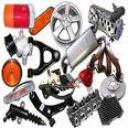April 10th, 2009 by Hal Moses
 Consumers can experience sensory overload when walking down the car care isle at their local store. It can be confusing to know what products to purchase, or even if you need to purchase them. Some people assume that if you have a factory auto warranty that includes the finish, you don’t need to bother washing and waxing, but this isn’t true.
Consumers can experience sensory overload when walking down the car care isle at their local store. It can be confusing to know what products to purchase, or even if you need to purchase them. Some people assume that if you have a factory auto warranty that includes the finish, you don’t need to bother washing and waxing, but this isn’t true.
A factory auto warranty will protect you by ensuring that the paint job was sound, that they used quality paint, and that it was cured correctly. However, new car warranties won’t protect you from oxidation that occurs over time. This happens naturally if you don’t care for your finish. Car wax serves the purpose of being a sacrificial layer between Mother Nature and your paint.
If new car owners want to keep their finishes looking great, they don’t have to spend a lot of time or money. Preventative maintenance is the key for your finish, just like it’s under the hood. All you have to do is wash your vehicle frequently with car care products. Even just a basic car wash will do a lot to help protect your investment. After washing, you can spray-on a wax that will boost the shine and extend the intervals between regular wax jobs.
April 9th, 2009 by Hal Moses
 A diesel engine used to elicit a wince from people who associated diesels with engine noise, a not so pleasant smell, and blue smoke coming out of the tailpipe. However, this is changing. Diesel engines will soon elicit a positive response.
A diesel engine used to elicit a wince from people who associated diesels with engine noise, a not so pleasant smell, and blue smoke coming out of the tailpipe. However, this is changing. Diesel engines will soon elicit a positive response.
The new generation diesels are considered clean. They use a very low sulfur diesel fuel that was made available in the United States in 2006. It is predicted by experts that diesel sales are going to increase approximately 300% within 10 years. One of the reasons for this is that diesel engines have around 20%-40% better fuel-efficiency than engines powered by gasoline.
The Clean Diesel Fuel Alliance claims that using ultra low sulfur fuel in these new and improved diesel engines will cause air quality to improve greatly. The yearly reductions in emissions will be the same as taking away the pollution from over 90% of the buses and trucks today. This is when the fleet of heavy-duty vehicles has been replaced by 2030.
It may take time to change perceptions about diesel engines, but people will begin to realize the benefits. Not only will they make our air cleaner, they will save people at the gas pump. However, as with any car, it is necessary to buy an auto warranty so you are covered in the case of failure.
April 9th, 2009 by Hal Moses
 It may be tempting to go to one of the giant retail chains that seem to be popping up everywhere for auto service, but is it smart? Well, there’s something to be said for building a relationship with your auto repair facility, and with a large chain, it’s not likely to happen.
It may be tempting to go to one of the giant retail chains that seem to be popping up everywhere for auto service, but is it smart? Well, there’s something to be said for building a relationship with your auto repair facility, and with a large chain, it’s not likely to happen.
Think about it, you go to a mass retailer for a repair, and then after a year the part fails. Yet, when you go back to the original location for an auto warranty claim, the first thing they ask for is your receipt. If you don’t have the receipt you’re out of luck. Chances are they will have no recollection of you or your car from the previous year.
Many people make the mistake of looking for a service shop just on the basis of price. However, you need to consider other factors when choosing a shop. Imagine how nice it would be to build a relationship with a shop where the mechanic recognizes you and your car and you feel a loyalty. We’ve all been in an emergency situation where we need a repair done that day. If you have a relationship with your mechanic, chances are that he will be more likely to squeeze you in.
Ultimately, the choice is up to you when choosing a service shop. However, keep in mind the benefits of being able to feel loyalty from your mechanic. And make sure you have used car warranties in order to have peace of mind.
April 9th, 2009 by Hal Moses
 Sometimes you can find great prices on a new vehicle, however, make sure you understand everything about the offers. Often there are exclusions, restrictions, or limitations that you need to understand.
Sometimes you can find great prices on a new vehicle, however, make sure you understand everything about the offers. Often there are exclusions, restrictions, or limitations that you need to understand.
Many car advertisements feature the big numbers in very large print, and scrunch down the unappealing stuff to mini print. There are several things that buyers need to look for.
Some offers are only available in certain states. Incentives are often regional, so they are only available to people within a specific area. If you cross the state line you might be paying $1,500 more.
Some deals on financing rely on the buyer paying a pre-determined down payment in cash. If you don’t provide the down payment you might have to pay a finance rate that is high.
Often times new car deals are only available if you buy before a specific date. This can make consumers feel pressure to make a fast decision, or buy a car off the lot that may not have everything they want.
There are many good deals to be had out there, but make sure you understand the small print. As a consumer you need to protect yourself by doing your homework and purchasing an auto warranty. After all, you don’t want to pay unnecessary repair costs if your new car needs service.
April 8th, 2009 by Hal Moses
 Most people believe that SUVs are the safest vehicles on the road; however, recent test results show that midsize SUVs may not offer the best safety. In fact, the Insurance Institute for Highway Safety says that a lot of cars produced better results in crash tests than six midsize SUVs.
Most people believe that SUVs are the safest vehicles on the road; however, recent test results show that midsize SUVs may not offer the best safety. In fact, the Insurance Institute for Highway Safety says that a lot of cars produced better results in crash tests than six midsize SUVs.
The SUVs tested were the Chevrolet Trailblazer, Nissan Pathfinder, Nissan Xterra, Ford Explorer, Jeep Grand Cherokee and Toyota 4Runner. These vehicles were tested in a front collision at 40mph and a side impact.
All of these vehicles showed improvement since the last IIHS test. In the instance of the front collision, five out of the six vehicles were rated Good. The Trailblazer was rated Acceptable.
However, the results of the side-impact tests weren’t as good. The Trailblazer and Grand Cherokee didn’t protect the torso because they are only equipped with standard side airbags to protect the head. The Pathfinder, 4Runner, and Xterra had better performance with side impact because they include side airbags that protect the torso as well as the head. However, cars had better ratings on side impact.
If you’re looking to purchase a midsize SUV, purchase one with high crash ratings. For instance, the Ford TaurusX and Edge, Hyundai Santa Fe, Honda Pilot, and Subaru Tribeca are the highest rated midsize SUVs. Although these SUVs are durable, it’s necessary to purchase an auto warranty to protect yourself from repair costs down the road. After all, no vehicle is full proof.
April 7th, 2009 by Hal Moses
 What features, besides an auto warranty, can help older drivers stay safe and comfortable on the road? The American Automobile Association has the following recommendations to help older drivers.
What features, besides an auto warranty, can help older drivers stay safe and comfortable on the road? The American Automobile Association has the following recommendations to help older drivers.
First, it is helpful to have a steering wheel that tilts and telescopes. This puts the driver 10 inches from the airbag, and also alleviates shoulder and neck pain.
Also helpful are mirrors that allow for wide visibility. This allows older drivers to compensate for a limited range of motion.
Seats that are heated with lumbar support allow relief from an aching back.
Six-way adjustable seats allow drivers who are short to see over the steering wheel, and allow for an easier entrance and exit out of the car.
A car with adjustable foot pedals will allow small drivers to be able to reach pedals while remaining far enough away from the airbag.
Four doors are better than two for older drivers because they are lighter and easier to open and close.
Purchasing the right car for an older driver is important for safety reasons. Keep these things in mind to help your loved one stay safe on the roads, and don’t forget to purchase used car warranties to avoid unnecessary repair expenses.
April 7th, 2009 by Hal Moses
 If you’re purchasing a pre-owned car you need to find out as much history as possible about it. The car may have problems that are not apparent from a visual inspection or a test drive.
If you’re purchasing a pre-owned car you need to find out as much history as possible about it. The car may have problems that are not apparent from a visual inspection or a test drive.
A car history report is a good way to find out what you’re getting. This is a report prepared by a third party that is a compilation of information from DMVs, RMVs, and other sources. A car history report will give you an overview of what the car has been through.
When getting a car history report look out for the following things. This is not to say that you shouldn’t buy the car based on these issues, but certainly ask questions.
If a car has had a lot of owners, chances are it hasn’t been cared for lovingly. These cars have probably endured more abuse.
Some areas of our country are easier on cars than others. For example, extreme winter conditions are tough on vehicles, as are flood areas and extreme heat.
Make sure the name and description of the car match up with the actual car. Read the description carefully to avoid vehicle fraud.
Car history reports, such as those from CARFAX are comprehensive and can save you from purchasing a lemon. Also, to protect yourself, purchase new car warranties to avoid unnecessary expenses down the road.
April 7th, 2009 by Hal Moses
 Car dealerships are going to great lengths to bring in business for servicing. This includes repainting, brightening lights, and adding new signs. And in the waiting area customers are enjoying WiFi access, flat screen TVs, workstations and coffee bars.
Car dealerships are going to great lengths to bring in business for servicing. This includes repainting, brightening lights, and adding new signs. And in the waiting area customers are enjoying WiFi access, flat screen TVs, workstations and coffee bars.
Dealers rely on their parts and service departments for profit. Typically half of their profits come from service, while the rest comes from sales of used and new cars.
But with the sales of new cars plummeting, most dealers lost money on new cars in 2007. This is why dealers are renovating their body shops, adding quick oil change lanes, and trying to compete with independent service shops. In a NADA survey in 2007, 29% of dealerships said they had upgraded their service shops recently.
Dealerships have also felt the squeeze because their auto warranty repairs have been cut way down and service appointments have been spaced further apart because of the improvements in car quality.
April 4th, 2009 by Hal Moses
 Most people don’t realize that there is certain etiquette involved when buying parts at the parts counter. Following this etiquette will allow you to get the parts that you want without unnecessary hassle and keep you from driving the staff crazy.
Most people don’t realize that there is certain etiquette involved when buying parts at the parts counter. Following this etiquette will allow you to get the parts that you want without unnecessary hassle and keep you from driving the staff crazy.
When you go to a parts counter at a dealership you need to have your VIN handy, which is basically the magic key to all of the car codes. At places such as Advance Auto or NAPA, you just need to know the make, model, year, and engine of your car.
Make sure to know what the part’s name is that you need. If this is something you don’t know, be able to describe what it looks like or what it is going to attach to. Don’t make up a name for the part you want; this is where 90% of wrong parts come from. If worse comes to worse, take the staff out to your car and point to the part you’re looking for.
When ordering an expensive part you want to ask about return policies and auto warranty terms. And get the answer in writing. This can be as simple as having him write the information on the receipt. This will save a lot of hassle if something breaks down the line.
Finally, don’t go to the parts counter to diagnose your vehicle. Counter-staff gets very annoyed when you try to return a part because it wasn’t even the problem in the first place.
Following these simple etiquette tips will allow you to get the parts that you need with little hassle. And make sure you have used car warranties, because you never know when your vehicle will need to be repaired.
April 4th, 2009 by Hal Moses
 It is a huge disappointment to buy a vehicle just to find out that it literally has an ocean of problems.
It is a huge disappointment to buy a vehicle just to find out that it literally has an ocean of problems.
Unfortunately, there are a large number of vehicles on the market within the last five years that have experienced flooding, rain or hurricanes. In fact, the number of cars has doubled. In certain states it has been reported that there has been an increase of six times more cars damaged by water than five years ago.
Many times, cars with water damage are moved from flooding regions to areas that are less suspicious. The cars are then back on the used car market, often disguised and rebuilt.
It can be difficult for consumers to be able to recognize if a vehicle has experienced water damage, and yet the car will literally rot inside and out. In addition, the mechanical systems of a vehicle can be threatened or ruined without any visible signs on the exterior of the car.
Sales this year are predicted to reach around 45 million this year, so motorists should be on alert for water damage. In addition, purchasing an auto warranty is a smart idea to protect your wallet in case of unforeseen repairs down the road.
 Consumers can experience sensory overload when walking down the car care isle at their local store. It can be confusing to know what products to purchase, or even if you need to purchase them. Some people assume that if you have a factory auto warranty that includes the finish, you don’t need to bother washing and waxing, but this isn’t true.
Consumers can experience sensory overload when walking down the car care isle at their local store. It can be confusing to know what products to purchase, or even if you need to purchase them. Some people assume that if you have a factory auto warranty that includes the finish, you don’t need to bother washing and waxing, but this isn’t true.











